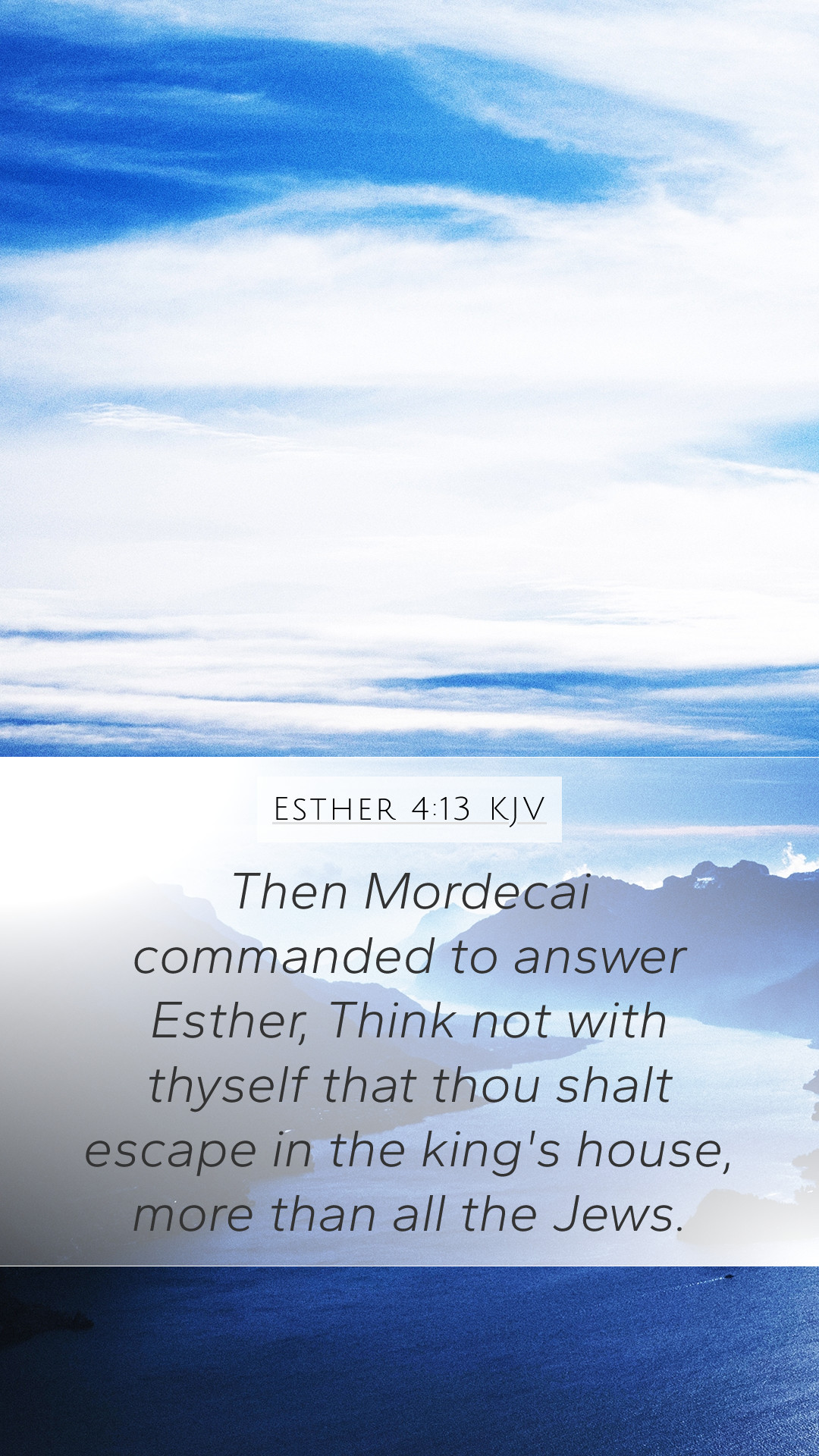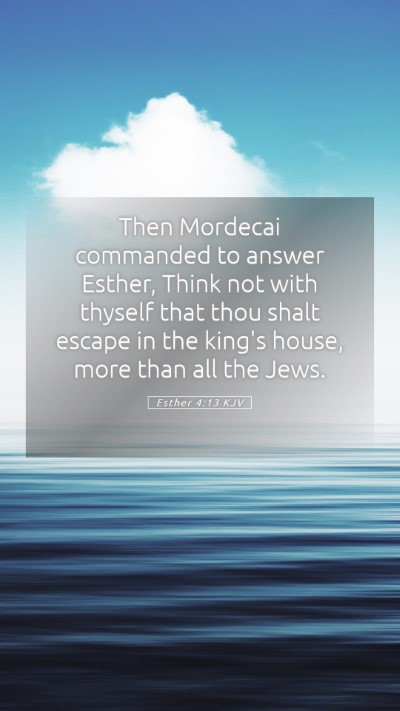Old Testament
Genesis Exodus Leviticus Numbers Deuteronomy Joshua Judges Ruth 1 Samuel 2 Samuel 1 Kings 2 Kings 1 Chronicles 2 Chronicles Ezra Nehemiah Esther Job Psalms Proverbs Ecclesiastes Song of Solomon Isaiah Jeremiah Lamentations Ezekiel Daniel Hosea Joel Amos Obadiah Jonah Micah Nahum Habakkuk Zephaniah Haggai Zechariah MalachiEsther 4:13 Meaning
What is the meaning of Esther 4:13?
Then Mordecai commanded to answer Esther, Think not with thyself that thou shalt escape in the king's house, more than all the Jews.
Esther 4:13 Bible Verse Meaning
Bible Verse Explanation: Esther 4:13
Verse: "Then Mordecai commanded to answer Esther, Think not with thyself that thou shalt escape in the king's house, more than all the Jews." (Esther 4:13 KJV)
The verse from Esther 4:13 emerges as a pivotal moment in the Book of Esther, drawing attention to the tension and peril faced by the Jewish people during a time of impending genocide. Mordecai's message to Esther serves both as a warning and a call to action, demonstrating the themes of responsibility, courage, and divine providence. Below, we explore the meaning of this verse through the lenses of various biblical commentaries.
Meaning and Insights from Commentaries
This analysis pulls insights from the works of notable biblical scholars such as Matthew Henry, Albert Barnes, and Adam Clarke. Each gives a unique interpretation, fleshing out the depth of Esther's situation and Mordecai’s advice.
Insights from Matthew Henry
Matthew Henry’s Commentary emphasizes the gravity of Mordecai’s words, indicating that Esther should not harbor the illusion that she is exempt from the fate that awaits the Jews simply because of her position in the palace. This commentary reflects the overarching theme of divine justice and the moral obligation of those in privileged positions to advocate for the oppressed.
- Call to Awareness: Esther's privilege does not guarantee safety; she must act for her people.
- Divine Purpose: Mordecai suggests that her rise to power may be divinely orchestrated for such a time as this (Esther 4:14).
Insights from Albert Barnes
Albert Barnes' Notes on the Bible further expound upon the idea that Esther must confront her fears. He remarks that her hesitation could lead to ruin not just for herself but also for her entire nation. Barnes indicates that God’s providence is a central theme, suggesting that Esther is positioned to make a significant difference.
- Encouragement to Act: Esther is urged to recognize her unique opportunity to intercede.
- Warning of Consequences: The fate of the Jews hangs in the balance, and her inaction has serious implications.
Insights from Adam Clarke
Adam Clarke's Commentary provides a historical context that adds depth to the understanding of Esther's plight. He notes the perilous atmosphere of the time when speaking out could lead to grave consequences, underlining the characteristics of bravery and the moral imperative to speak on behalf of the voiceless.
- Historical Context: Understanding the Jewish plight can reveal the stakes attached to Esther’s decision.
- Moral Responsibility: Clarke suggests that Esther’s hesitation reflects a broader human reluctance to confront difficult situations.
Significance of Esther 4:13
This verse is a profound reminder of the ethical obligation faced by individuals in positions of power. Modern readers often question how these themes can apply to their lives—whether during troubling times in history or in contemporary social justice movements.
Application of the Verse
As believers engage with Esther 4:13, the lessons extend beyond the historical narrative:
- Acting with Courage: One is encouraged to stand up against injustice.
- Understanding Providence: Recognizing that one's circumstances may serve a higher purpose.
- Community Responsibility: A call to aid others in peril and to not isolate oneself in times of crisis.
Bible Cross References
To deepen one's understanding of Esther 4:13, here are key cross-references:
- Esther 4:14: Addresses the potential divine purpose behind Esther’s position.
- Proverbs 24:11-12: Encourages rescuing those being led to slaughter.
- Isaiah 59:15-16: Highlights God’s concern for justice and the lack of intercessors.
Conclusion
Esther 4:13 serves as a powerful exhortation for courage and responsibility not only within the context of its historical setting but also in our contemporary lives. It challenges readers to reflect on their roles within their communities and to act when called upon, a relevant message for those studying Bible verse meanings, interpretations, and applications.
By examining this verse and its implications, individuals can partake in a richer study of Scripture, gaining insights that are applicable both in personal faith journeys and in collective community actions.


